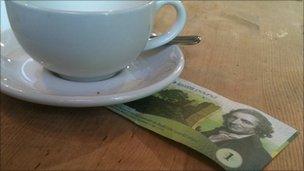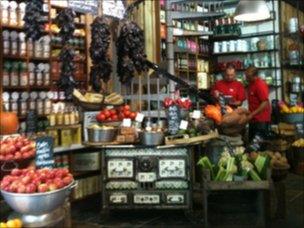Do local schemes such as the Lewes pound have a future?
- Published

Lewes' currency comes in one, five and 10 and 21 pound notes
Cliffe High Street in Lewes has a uniquely traditional feel about it.
Among the independent shops on the busy thoroughfare are names like Percy's Fishing Tackle, The Gardener's Arms and May's General Store.
On 14 September 2008 as the world felt the first blow of what was to deepen into a financial crisis with the collapse of the US giant bank Lehman brothers, the traders of Cliffe High Street in Lewes became part of a micro-economic experiment designed to bring greater financial resilience and independence to their town.
The Lewes pound was born.
The idea was simple: create a complementary currency which could be exchanged for sterling but could only be used within the confines of Lewes with the aim of bringing loyalty and therefore trade to independent shops as well reducing the carbon footprint of it's residents.
Valuable lesson
Complementary currencies have existed in different cultures for centuries.
But they came into their own during the 1930's.
"The biggest explosion of them came in the Great Depression, mainly in America but also in Central Europe and to a far lesser extent in the UK," , says David Boyle from the New Economics Foundation (NEF).
"The British have always been very conservative about money, they don't realise as other countries do, that you can experiment and create your own if you're running out of cash.
"I think that is a lesson we still have to learn over here," he said.
'Changing behaviour'
Residents of Lewes aren't the only ones trying to learn that lesson. There are also local pounds to be found in London's Brixton, Stroud in Gloucestershire and Totnes in Devon.
So do local pounds work?

The owner of Bill's Produce Store and Cafe supports the idea, but fears it has lost momentum
"The individual cash has, I believe, a small economic effect but the behaviour change that it can cause has a much bigger impact," Patrick Crawford, a member of the Lewes pound group says.
But when asked whether shoppers will be opening their purses and wallets and using it today he accepts it may be a little hard to find.
"Some people are - if that's not too diplomatic. I think it's working."
I show the notes to a number of shoppers. Some recognise it, others don't.
A few people like the idea but say they never see them, whilst one man tells me they're a great and he uses them when he can.
Taking off
Two years ago, locals swapped £30,000 for Lewes notes. These stayed in circulation for a year before being withdrawn.
A new issue worth £15,000 will be in use for the next four years.
But the town has plans and is currently advertising for a co-ordinator to push the project on.
However, some think local currencies will need to become more sophisticated to really take off.
"I don't think we're going to see a huge difference in this country until they start being able to get loans in them - very low interest loans or perhaps interest free loans," says NEF's David Boyle.
"At that point I think it starts to have the real potential to make an economic impact. So copying what they do in Switzerland for example, where there is a parallel currency, and where you can get very low interest loans.
"When local authorities start catching on to the possibilities then we'll see a real difference over here."
'Lost momentum'
Bill's Produce Store and Café is one place in Lewes where the pound is accepted. Owner Bill Collison thinks the idea has lost momentum but it is an idea worth fighting for.
"When the Lewes pound came out we all grabbed at it," he says.
"It seemed to come out at a time when the world was sort of sinking and the Lewes pound became the major talking point.
"I think we can work hard to make it used more again. It's something I think Lewes people are proud of. We still see them in the tills quite a lot."
Busker Tim Bolwell is also a fan.
"Every now and again someone puts a Lewes pound in my hat.
"Any kind of pound is good to me, it's certainly better than getting pence."
But with retail expansion increasingly global, do small local currencies have a future?
"I think local currencies have a critical role to play," David Boyle says.
"Although this is many years off, increasingly we'll be using many different currencies in our day-to-day lives for different aspects of our lives."